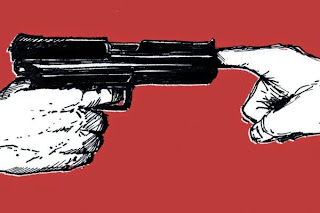An editorial entitled "Absence of Leadership" appeared in the New York Times on September 24, 2008. This editorial details the lack of leadership by then-President Bush and presidential candidates Barack Obama and John McCain. Specifically, the editorial delves into their lack of leadership regarding the current economic crises and passes judgment on each of the individuals. The editor, Gerald Marzorati, states that President Bush’s lack of leadership is a primary reason for the financial crisis, John McCain offers inconsistent leadership and ignorant solutions, and Barack Obama lacks the firmness and solidarity to offer concrete fixes. As a result, Marzorati concludes that all three men are ineffective leaders. These three separate conclusions become premises for the overarching argument that there is an absence of effective leadership to guide America through these difficult financial times.

The focus of the entire editorial is effective leadership. Marzorati's view of an effective leader appears to consist of two criteria. A leader must be competent and able to understand the issues as well as instrumental and able to take action to implement needed changes. President Bush and Senator McCain, as detailed by Marzorati in the editorial, lack both competency and initiative. Senator Obama, on the other hand, only lacks the adequate initiative. Yet, it is resolved that all three lack the effective leadership for times of economic hardship.
The first major premise in the editorial's argument is the result of a conclusion regarding President Bush. The editor concludes that President Bush is not an effective leader, partly because he is not a competent leader. Marzorati concludes this because he views President Bush as one of the main reasons that the United States is currently in the midst of an economic crisis. The editor explicitly states, "[Bush's] contempt for regulation is a significant cause of the current mess" (Marzorati 1). This argument is founded in the premise that President Bush has contempt for regulation. From there, the editor implies that contempt for regulation leads to lax laws regarding regulation and that lax regulation laws are a significant cause for the economic downturn. The conclusion may be drawn that a President who provokes a significant downturn in the economy is not a competent leader. The reasoning is valid based on those given and implied premises. Furthermore, both the premises and the conclusion appear to be true. Outside research of the argument reveals that President Bush argued against substantial new regulations for financial markets in a November 2008 speech, saying, "It would be a terrible mistake to allow a few months of crisis to undermine 60 years of success" (Schoen 1). President Bush exhibits a history of opposing regulatory measures, thus affirming the accuracy of the premises. As a result of the argument’s validity, the conclusion that President Bush is not a competent leader during economic crises must also be true.
The other assertion regarding President Bush as formulated in "Absence of Leadership" concerns his minimal leadership in ushering our nation through the financial crisis. The editorial makes these assumptions clear, not as much through a formal argument, but rather through the language that it employs to characterize President Bush and his address to the nation regarding these trying situations. Phrases such as "superficial assurance", "eerily dispassionate primer", "shockingly weak performance", and “all he had to offer was fear itself" imply that President Bush is not of any assistance in the solution to this problem (Marzorati 1). Furthermore, his ignorance is deplored through spirited language by stating, "There was no acknowledgement of the shocking failure of government regulation, or that the country cannot afford more tax cuts for the very wealthy and budget-busting wars, or that spending at least $700 billion of taxpayers’ money to bail out Wall Street and the banks should be done carefully, transparently and with oversight by Congress and the courts" (Marzorati 1). Once again, President Bush's lack of leadership is implied. The major premise of the argument derived from this spirited language is that a good leader does not lead his country into a financial crisis and stand by to watch it happen. Marzorati asserts that President Bush has led America into the present economic crisis and has done nothing to aid in its recovery and, therefore, President Bush is a bad leader. Though the premises are believable and the reasoning is valid, it is not readily apparent that all likely relevant information was considered. An evident bias exists and the editor appears to solely utilize information that benefits his argument. The fact that there appears to be a biased author, though, does not necessarily diminish the argument’s validity or correctness. The supporting evidence of the argument should be verified, as with any other argument, to truly ascertain whether the premises are correct as well as to determine the cogency of the argument. In this case, further research verifies the quality of the argument. Investigating the facts to determine the quality the argument, one finds that President Bush, as late as February 2008, maintained, "the country is not in a recession" (Chadwick 1). Denying the existence of a recession was just the first of many observed steps in the mishandling of the economic crises by the Bush administration. This specific example, though, is solid evidence because a leader who does not recognize a problem cannot offer meaningful solutions to the problem. Though Marzorati's editorial contains forceful language and a perceived bias, there exists enough supporting evidence to deem the premises and conclusion as accurate. Based on Marzorati's logic, one must conclude that President Bush is an ineffective leader as a result of his incompetence and his inability to lead the country through the crises.
After concluding President Bush’s ineffectiveness, Marzorati looks to evaluate the leadership capabilities of the two then - Presidential candidates, Barack Obama and John McCain. The editor determines that John McCain's leadership is not satisfactory. He bases this conclusion upon two premises and one implied premise. He asserts that John McCain’s understanding of the economy is deficient and he also asserts that the Republican nominee's stances are inconsistent. Based upon the implied premise assumed by Marzorati that being an incompetent and inconsistent leader makes one a substandard leader, one must also concludes that John McCain is not a qualified leader for the present financial trials. The reasoning within this premise is once again valid. An inconsistent and incompetent individual is not a desirable leader. Therefore, it is a validargument. However, the truthfulness of the premises remains to be ascertained. The implied premise, as already mentioned, appears accurate. The evidence supplied to support the other two premises also appears to be correct. As shown inthe editorial, McCain's understanding of the economy as "strong", his constant changes of position regarding the bailout, and his lack of proposed regulation appear to reveal incompetency and inconsistency (Marzorati 1). However, as with his analysis of President Bush, the editor presents a bias. Marzorati's use of language suggests a dislike for Senator McCain. Phrases such as "ignoring the deep distress", "as if there were a mystery to be solved", and "not the slightest clue" attempt to ridicule McCain and put the reader in the same mindset as the editor (Marzorati 1). This perceived bias, however, does not necessarily diminish the quality of the argument. Senator McCain has been quoted as saying, "I'm going to be honest: I know a lot less about economics than I do about military and foreign policy issues. I still need to be educated" (Issenberg 1). On another occasion, Senator McCain stated, "The issue of economics is not something I’ve understood as well as I should, but I've got Greenspan’s book" (Smith 1). McCain's own documented words and actions reveal enough evidentiary support to resolve Marzorati’s conclusion as true and affirm the quality of the argument. As a result, it may be concluded that Senator McCain is not an effective leader during times of financial hardship.
Barack Obama’s leadership effectiveness is critiqued to finish the editorial. Marzorati concludes that Barack Obama would be a more competent leader than Bush or McCain, but still not an effective leader. The conclusion that Senator Obama would be a competent leader is based on the premise that Obama understands the financial problems and the steps required to fix them. The implied premise is that a leader who understands the problem and the solution is a competent leader. The editorial clearly details the ways in which Obama understands the crisis, thus affirming the quality of the argument.
The other conclusion regarding Barack Obama is that he is not an instrumental leader. The implied premise is that a candidate who does not offer "full prescriptions" is not instrumental (Marzorati 2). Marzorati claims that Obama is one of these candidates. This seems to be a valid argument to make. While based in opinion, a fully functional plan would make for a more effective leader. Further research affirms the quality of the premises. In September 2008, Senator Obama revealed, "he's not spelling out details of his own plans to avoid roiling the markets" (Glover 1). Even Barack Obama, as a result of his inability to call for instrumental changes, is deemed an in effective leader for these economic struggles.
Try introducing your thesis statement with the phrase 'this 1000 word essay will argue' or 'this 1000 word essay argues'.
Gerald Marzorati in "Absence of Leadership" details the shortcomings of President Bush and then-Presidential candidates John McCain and Barack Obama. The overarching conclusion is that there is an absence of effective leadership in America during this financial crisis. This claim is founded in the three premises that President Bush lacks effective leadership, John McCain lacks effective leadership, and Barack Obama lacks effective leadership. Based on the conclusions in this editorial, which have now become the premises of a larger conclusion, as well as the fact that these three men are the leaders of America, that reasoning appears valid. Though the language of the editorial implies bias, there is enough substantiation to declare that there truly is an absence of leadership.














